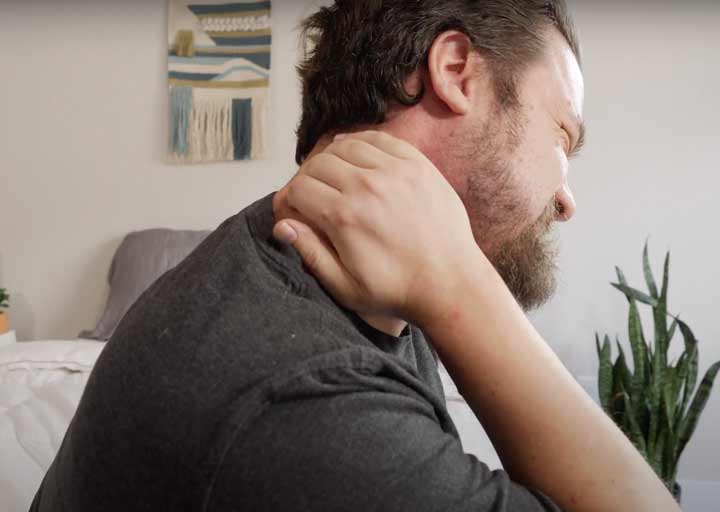Looking for the best way to reduce your risk of athletic injury and to ensure that your post-workout recovery times are optimized? Well, why not sleep on it? No, really: One of the best ways you can minimize your risk of injury and speed up your muscle recovery time is to get some shut-eye and give your body time to heal and replenish.
Sleep and Muscle Recovery
There is plenty of research to show that sleep promotes athletic performance. But what makes sleep such an important component in athletic recovery? Getting enough sleep helps you continue to perform for longer periods of time without getting muscle aches.
Also, sleep allows the body to digest food with less energy, which means the body can channel that energy into building proteins and transporting the fatty acids needed for muscle recovery.
One of the ironies here is that sleep is necessary for bolstering athletic performance, and yet an increased training load can also make it more difficult for athletes to sleep. In other words, athletes who try to step up their training regimens may find that they are sleeping less. One explanation is that, as athletes try to increase their workloads, their body releases stress hormones to try to cope with the additional strain. These stress hormones can have the side effect of restlessness and insomnia.
RELATED: Best Mattresses for Athletes
How Can You Promote Muscle Recovery Before Bed?
There are many ways you can promote muscle recovery before you go to bed at night, but before making these changes, consult with your doctor.
- Rest the injured muscle.
- Use an ice pack if that is advised by your doctor
- Make sure you stay adequately hydrated
- Meditate or practice yoga. This can help you feel more relaxed, and it can ease muscle tension.
- Drink a casein protein shake before bed. The protein is absorbed into your body while sleeping and can improve muscle recovery.
- If you have a muscular injury, you may want to consume more protein and fats. Consult your doctor before changing your diet.
- Similarly, if you have a bone injury, you may want to consume more calcium, vitamin D, and iron.
Sleep And Injury Prevention
There are a number of ways in which sleep can help prevent athletic injury. For one, the more sleep you get, the more time your body has to secrete growth hormones, which repair and strengthen your muscles, tendons, and ligaments.

Additionally, sleep helps improve response times, which can help prevent athletes from getting injured on the field. Sleep can also improve the immune system, which makes athletes less likely to get sick when exposed to germs and viruses.
Fitness trainer Caitlin Sacasas notes that sleep deprivation can “cause our body to be in a more stressed and inflamed state, increasing the risk of injury and reducing our muscle recovery potential.”
Why Do Younger Athletes Need More Sleep?
Sleep is vital for athletes at any age, but it’s especially crucial for adolescent and college-aged athletes. Sleep deprivation is linked to injuries in adolescent athletes,because it can cause slow reaction time, impaired coordination, and fatigue. Adequate sleep helps promote the production of growth hormones that teen and college-age athletes need.
How To Sleep While Recovering From Injuries
Even athletes who get sufficient sleep may experience accidents and injuries. When dealing with an injury, sleep becomes even more critical, because it can expedite the body’s healing process.
According to Samantha Watson, a Functional Movement Specialist at Start Rowing, “getting a good night’s sleep whilst recovering from an injury can help you maintain muscle mass, or at the very least, reduce the amount of muscle lost during your recovery period“.
Here are a few basic tips on sleeping well while dealing with common sports injuries.
Neck and Shoulder Pain
If you’re dealing with neck pain, make sure to find a pillow that helps keep your neck in the correct alignment. Adjustable pillows, like the Coop Original, work well because you can easily change the height.

If you’re a side sleeper with an injured shoulder, you may need extra pressure relief. A memory foam mattress topper could help cushion your joints and promote the proper spinal alignment.
Check out more ways you can sleep with neck and shoulder pain.
Knee Pain
Knee pain is also common among athletes. One way to promote a comfortable night’s rest is to sleep on your side and place a small pillow between your knees. Some pregnancy pillows, such as the Boppy, can help alleviate pressure between the knees.
Back Pain
What about athletes who deal with bad backs? Though it may seem counterintuitive, it’s best to sleep on the back. This sleeping position helps promote an even distribution of body weight, whereas sleeping on the stomach or side may put too much pressure on sensitive areas. Take a look at our list of the best mattresses for back pain for some good options.
Concussions
If you’ve had a concussion, the first step is always to consult with a doctor. After doing this, make sure to avoid any bright or blue light during the night; these may disrupt your circadian rhythms and prevent you from getting rest. Keep the bedroom dark and cool.
And if you need extra help falling to sleep, try some meditation or other relaxing activities before climbing into bed.
Sleep Hygiene Tips for Athletes
Whether you’re dealing with an injury or not, good sleep hygiene is important for athletic performance. Here are a few ways you can strengthen your sleep habits and improve the quality of your rest.
Maintain a Consistent Sleep Schedule
When you keep a regular sleep schedule, it’s easier to fall asleep and stay asleep. Though it may be tempting to sleep in on weekends, try to wake up around the same time every day.
Don’t Work in Bed
When you work or watch TV in bed, your mind may associate the mattress with mental activity. This can make it more difficult to fall asleep at night, so it’s best to try not to work in bed.
Avoid Caffeine and Alcohol Before Bedtime
Though alcohol may help you fall asleep quickly, it can prevent you from getting the restorative rest you need. A 2019 study suggests that alcohol can disrupt circadian rhythms.

Caffeine can also negatively impact sleep because it blocks the adenosine receptors that make people feel tired. One study found that when participants consumed caffeine three to six hours before bed, it negatively affected their sleep quality.
Last Word from Mattress Clarity
When you play a sport or spend a lot of time at the gym, injuries can happen. The good news is that there are some simple ways to minimize your risk. First and foremost: Ensure you’re giving your body the rest time that it needs.
FAQs
Does sleep help with muscle recovery?
Does sleep help injury prevention?
Research suggests that sleep can help prevent injuries. People who are sleep deprived are more likely to get injured.

